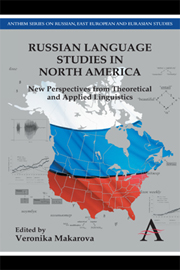Book contents
- Frontmatter
- Contents
- List of Tables and Figures
- Introduction
- Part One Language Structures and their Interface
- 1 Phonetics. Tracing Emotions in Russian Vowels
- 2 Phonology. Vowel–Zero Alternations in Russian Prepositions: Prosodic Constituency and Productivity
- 3 Morphology and Lexicology Interface. Latest Russian Neologisms: The Next Step towards Analytism?
- 4 Syntax. Bi-nominative Sentences in Russian
- 5 Psycholinguistics. The Effect of Grammatical Gender in Russian Spoken-Word Recognition
- Part Two Applied Linguistic and Sociolinguistic Analysis
- Afterword
- Index
4 - Syntax. Bi-nominative Sentences in Russian
from Part One - Language Structures and their Interface
Published online by Cambridge University Press: 05 November 2012
- Frontmatter
- Contents
- List of Tables and Figures
- Introduction
- Part One Language Structures and their Interface
- 1 Phonetics. Tracing Emotions in Russian Vowels
- 2 Phonology. Vowel–Zero Alternations in Russian Prepositions: Prosodic Constituency and Productivity
- 3 Morphology and Lexicology Interface. Latest Russian Neologisms: The Next Step towards Analytism?
- 4 Syntax. Bi-nominative Sentences in Russian
- 5 Psycholinguistics. The Effect of Grammatical Gender in Russian Spoken-Word Recognition
- Part Two Applied Linguistic and Sociolinguistic Analysis
- Afterword
- Index
Summary
Krasota – èto istina, a istina – èto krasota
‘Beauty is truth, truth beauty’
—John Keats, “Ode on a Grecian Urn”Russian has a very frequent type of sentence, known as bi-nominative: Rim – stolica Italii lit. ‘Rome capital Italy's.’ In this connection, the following wellknown problem emerges: What is the syntactic subject and what is the syntactic predicate in such a sentence? The answer to this question, apparently simple, but in fact very tricky, lies in a semantic analysis of bi-nominative sentences.
Bi-nominative Sentences in Russian
A Russian bi-nominative sentence has a “kernel” consisting of two Noun Phrases in the nominative [= NPnom], with or without an explicit form of the verb byt′ ‘be’ between them. In other words, both the syntactic subject and the syntactic predicative of a bi-nominative sentence are NPnoms:
(1) a. Moj synnominženernom lit. ‘My son engineer’ [= ‘My son is an engineer’].
b. Svoistvonom5 – sledstvienomsledujuščego fakta lit. ‘Property 5 corollary following fact's’ [= ‘Property 5 is a corollary of the following fact’].
c. Rimnom – stolicanomItalii lit. ‘Rome capital Italy's’ [= ‘Rome is Italy's capital’].
d. Èti ljudinom – naši druz′janom lit. ‘These people our friends’ [= ‘These people are our friends’].
Such sentences, when they do not have an overt copula, are also known as “nominal sentences” (Rus. imennye predloženija).
The present discussion is based on the following crucial fact:
In Russian, a bi-nominative sentence [= BS] necessarily contains a finite form of the verb byt′: in cases where there is no overt verb form, a BS includes a zero wordform of byt′, this zero expressing the present indicative of ‘be’.
- Type
- Chapter
- Information
- Russian Language Studies in North AmericaNew Perspectives from Theoretical and Applied Linguistics, pp. 85 - 106Publisher: Anthem PressPrint publication year: 2012



